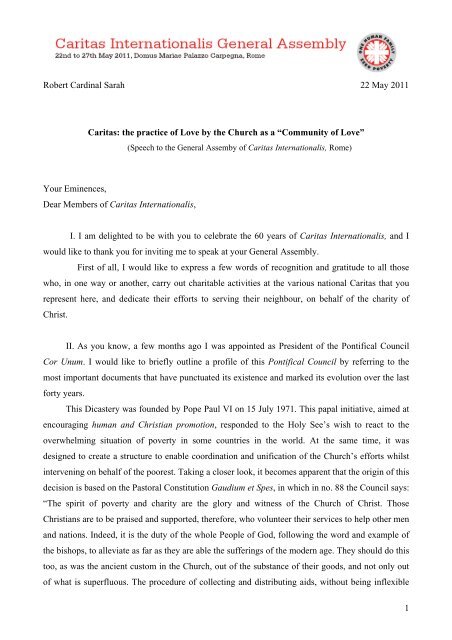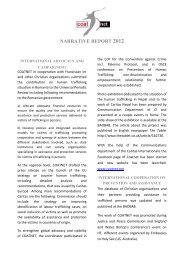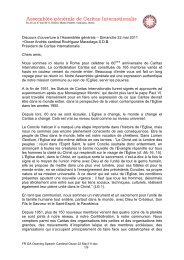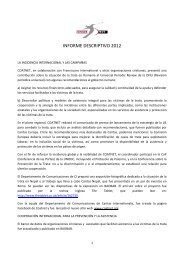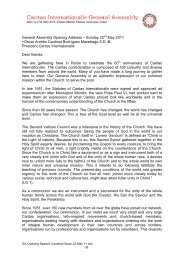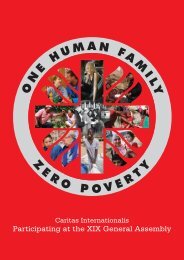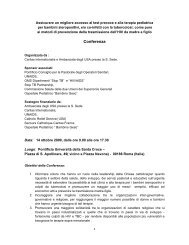"Caritas: the practice of Love by the Church as a "Community of Love"
"Caritas: the practice of Love by the Church as a "Community of Love"
"Caritas: the practice of Love by the Church as a "Community of Love"
You also want an ePaper? Increase the reach of your titles
YUMPU automatically turns print PDFs into web optimized ePapers that Google loves.
Robert Cardinal Sarah 22 May 2011<br />
<strong>Carit<strong>as</strong></strong>: <strong>the</strong> <strong>practice</strong> <strong>of</strong> <strong>Love</strong> <strong>by</strong> <strong>the</strong> <strong>Church</strong> <strong>as</strong> a “<strong>Community</strong> <strong>of</strong> <strong>Love</strong>”<br />
(Speech to <strong>the</strong> General Assem<strong>by</strong> <strong>of</strong> <strong>Carit<strong>as</strong></strong> Internationalis, Rome)<br />
Your Eminences,<br />
Dear Members <strong>of</strong> <strong>Carit<strong>as</strong></strong> Internationalis,<br />
I. I am delighted to be with you to celebrate <strong>the</strong> 60 years <strong>of</strong> <strong>Carit<strong>as</strong></strong> Internationalis, and I<br />
would like to thank you for inviting me to speak at your General Assembly.<br />
First <strong>of</strong> all, I would like to express a few words <strong>of</strong> recognition and gratitude to all those<br />
who, in one way or ano<strong>the</strong>r, carry out charitable activities at <strong>the</strong> various national <strong>Carit<strong>as</strong></strong> that you<br />
represent here, and dedicate <strong>the</strong>ir efforts to serving <strong>the</strong>ir neighbour, on behalf <strong>of</strong> <strong>the</strong> charity <strong>of</strong><br />
Christ.<br />
II. As you know, a few months ago I w<strong>as</strong> appointed <strong>as</strong> President <strong>of</strong> <strong>the</strong> Pontifical Council<br />
Cor Unum. I would like to briefly outline a pr<strong>of</strong>ile <strong>of</strong> this Pontifical Council <strong>by</strong> referring to <strong>the</strong><br />
most important documents that have punctuated its existence and marked its evolution over <strong>the</strong> l<strong>as</strong>t<br />
forty years.<br />
This Dic<strong>as</strong>tery w<strong>as</strong> founded <strong>by</strong> Pope Paul VI on 15 July 1971. This papal initiative, aimed at<br />
encouraging human and Christian promotion, responded to <strong>the</strong> Holy See’s wish to react to <strong>the</strong><br />
overwhelming situation <strong>of</strong> poverty in some countries in <strong>the</strong> world. At <strong>the</strong> same time, it w<strong>as</strong><br />
designed to create a structure to enable coordination and unification <strong>of</strong> <strong>the</strong> <strong>Church</strong>’s efforts whilst<br />
intervening on behalf <strong>of</strong> <strong>the</strong> poorest. Taking a closer look, it becomes apparent that <strong>the</strong> origin <strong>of</strong> this<br />
decision is b<strong>as</strong>ed on <strong>the</strong> P<strong>as</strong>toral Constitution Gaudium et Spes, in which in no. 88 <strong>the</strong> Council says:<br />
“The spirit <strong>of</strong> poverty and charity are <strong>the</strong> glory and witness <strong>of</strong> <strong>the</strong> <strong>Church</strong> <strong>of</strong> Christ. Those<br />
Christians are to be praised and supported, <strong>the</strong>refore, who volunteer <strong>the</strong>ir services to help o<strong>the</strong>r men<br />
and nations. Indeed, it is <strong>the</strong> duty <strong>of</strong> <strong>the</strong> whole People <strong>of</strong> God, following <strong>the</strong> word and example <strong>of</strong><br />
<strong>the</strong> bishops, to alleviate <strong>as</strong> far <strong>as</strong> <strong>the</strong>y are able <strong>the</strong> sufferings <strong>of</strong> <strong>the</strong> modern age. They should do this<br />
too, <strong>as</strong> w<strong>as</strong> <strong>the</strong> ancient custom in <strong>the</strong> <strong>Church</strong>, out <strong>of</strong> <strong>the</strong> substance <strong>of</strong> <strong>the</strong>ir goods, and not only out<br />
<strong>of</strong> what is superfluous. The procedure <strong>of</strong> collecting and distributing aids, without being inflexible<br />
1
and completely uniform, should never<strong>the</strong>less be carried on in an orderly f<strong>as</strong>hion in dioceses,<br />
nations, and throughout <strong>the</strong> entire world...” (GS no. 88).<br />
Regarding coordination with <strong>the</strong> charitable organisations <strong>of</strong> <strong>the</strong> <strong>Church</strong>, it should be<br />
emph<strong>as</strong>ised that our activity is guided <strong>by</strong> <strong>the</strong> principle <strong>of</strong> <strong>the</strong> integral development <strong>of</strong> <strong>the</strong> human<br />
person. Therefore, it is not merely philanthropic and humanitarian <strong>as</strong>sistance aimed at relieving a<br />
certain kind <strong>of</strong> distress, but also and above all it entails giving back to human persons all <strong>the</strong>ir<br />
dignity <strong>as</strong> children <strong>of</strong> God, and promoting an anthropology that also encomp<strong>as</strong>ses <strong>the</strong> religious<br />
dimension <strong>of</strong> human persons, namely <strong>the</strong>ir encounter with God.<br />
In his Encyclical Populorum progressio, published in 1967, Pope Paul VI w<strong>as</strong> already<br />
illuminating <strong>the</strong> great <strong>the</strong>me <strong>of</strong> <strong>the</strong> development <strong>of</strong> peoples, <strong>the</strong> splendour <strong>of</strong> truth and <strong>the</strong> gentle<br />
light <strong>of</strong> Christ’s Charity. “He taught that life in Christ is <strong>the</strong> first and principal factor <strong>of</strong><br />
development and he entrusted us with <strong>the</strong> t<strong>as</strong>k <strong>of</strong> travelling <strong>the</strong> path <strong>of</strong> development with all our<br />
heart and all our intelligence, that is to say with <strong>the</strong> ardour <strong>of</strong> charity and <strong>the</strong> wisdom <strong>of</strong> truth. It is<br />
<strong>the</strong> primordial truth <strong>of</strong> God's love, grace bestowed upon us, that opens our lives to gift and makes it<br />
possible to hope for a “development <strong>of</strong> <strong>the</strong> whole man and <strong>of</strong> all men” (Pope Benedict XVI, <strong>Carit<strong>as</strong></strong><br />
in veritate no. 8)<br />
The fundamental document for us is <strong>the</strong> Encyclical Deus <strong>Carit<strong>as</strong></strong> est. Published in 2005, it<br />
presents an <strong>of</strong>ficial doctrine on charity for <strong>the</strong> first time. For Pope Benedict XVI, <strong>the</strong> imperative and<br />
<strong>practice</strong> <strong>of</strong> charity, love <strong>of</strong> one’s neighbour, are vitally important. The <strong>Church</strong> cannot renounce her<br />
proclamation, even though nowadays, at le<strong>as</strong>t in <strong>the</strong> Western world, a humanism without God<br />
seems to have become an integral and l<strong>as</strong>ting part <strong>of</strong> <strong>the</strong> prevailing culture. Pope Jean Paul II spoke<br />
bitterly <strong>of</strong> countries where religion and <strong>the</strong> Christian life were once flourishing absolutely and<br />
capable <strong>of</strong> generating communities <strong>of</strong> living and active faith, which today have been radically<br />
transformed <strong>by</strong> <strong>the</strong> incessant spread <strong>of</strong> religious indifference, secularisation and a<strong>the</strong>ism. This<br />
particularly concerns <strong>the</strong> nations <strong>of</strong> what is called <strong>the</strong> First World, where economic wellbeing and<br />
<strong>the</strong> rush to consume inspire and nourish a life lived “<strong>as</strong> if God didn't exist”. Currently, faced with<br />
<strong>the</strong> serious problems <strong>of</strong> life, religious indifference and <strong>the</strong> total lack <strong>of</strong> meaning that is attributed to<br />
God are no less worrying nor deleterious than overt a<strong>the</strong>ism. Toge<strong>the</strong>r with enormous material,<br />
scientific and technological progress, <strong>the</strong> West is now experiencing a serious moral regression and a<br />
gradual “silent apost<strong>as</strong>y” (cf. Christifideles Laici, no. 34). Undoubtedly, since <strong>the</strong> beginning <strong>of</strong> his<br />
papacy, Pope Benedict XVI h<strong>as</strong> considered this “religious indifference” and “silent apost<strong>as</strong>y” <strong>as</strong> <strong>the</strong><br />
major challenge <strong>the</strong> <strong>Church</strong> h<strong>as</strong> to take up today in her relations with <strong>the</strong> modern world. Therefore,<br />
he is more determined than ever to make our minds more aware and our faith more visible and more<br />
2
active, in order to show <strong>the</strong> world that <strong>the</strong> <strong>Church</strong>’s mission is deeply rooted in faith in God: Fa<strong>the</strong>r,<br />
Son and Holy Spirit. The same is also undoubtedly true for diakonia. Indeed, toge<strong>the</strong>r with<br />
proclamation <strong>of</strong> <strong>the</strong> Faith and <strong>the</strong> liturgy, diakonia fulfils <strong>the</strong> <strong>Church</strong>’s mission.<br />
In recent years, <strong>the</strong> <strong>the</strong>me <strong>of</strong> charity h<strong>as</strong> expanded greatly, which also extends this<br />
Dic<strong>as</strong>tery’s field <strong>of</strong> action. Many new problems – such <strong>as</strong> <strong>the</strong> perception <strong>of</strong> and <strong>the</strong>ological<br />
reflection on charity, <strong>the</strong> difference between <strong>the</strong> <strong>the</strong>ology <strong>of</strong> charity and <strong>the</strong> social teaching <strong>of</strong> <strong>the</strong><br />
<strong>Church</strong>, <strong>the</strong> ecclesial link between Catholic aid agencies, <strong>the</strong> motivations behind <strong>the</strong> charitable<br />
engagement <strong>of</strong> Christians, Catholic voluntary service and relations with public institutions – have<br />
emerged, which h<strong>as</strong> obliged <strong>the</strong> Pontifical Council Cor Unum to initiate in-depth <strong>the</strong>ological<br />
reflection on <strong>the</strong> concept <strong>of</strong> Charity and on which path, amongst o<strong>the</strong>rs, should be taken <strong>by</strong> Catholic<br />
charity agencies in <strong>the</strong> light <strong>of</strong> Deus <strong>Carit<strong>as</strong></strong> est. We should carry out this reflection and in-depth<br />
study toge<strong>the</strong>r in order to be loyal to our faith in Jesus, which tells us: “By this everyone will know<br />
that you are my disciples, if you love one ano<strong>the</strong>r” (Jn 13:35).<br />
This being so, we might wonder how we can ensure that <strong>the</strong> salt <strong>of</strong> Charity <strong>of</strong> so many<br />
faithful lay people, and consecrated people and <strong>the</strong>ir religious families, doesn’t lose its flavour.<br />
How can we help faithful lay people and religious, who run charitable organisations or charity<br />
institutions that have proved <strong>the</strong>ir robustness over <strong>the</strong> years, to experience a new docility in <strong>the</strong><br />
wind <strong>of</strong> Pentecost, and move from works <strong>of</strong> law to works <strong>of</strong> faith? How can we help faithful lay<br />
people and religious engaged on <strong>the</strong> frontlines <strong>of</strong> emergency situations (immigration, refugees,<br />
people displaced <strong>by</strong> war or natural dis<strong>as</strong>ters, prisons, <strong>the</strong> p<strong>as</strong>toral care <strong>of</strong> street children, etc.) to<br />
know how to “say” every day, in a credible way, <strong>the</strong> freshness <strong>of</strong> <strong>the</strong> evangelical proclamation in<br />
what <strong>the</strong>y are and what <strong>the</strong>y do? If <strong>the</strong> world we live in really is <strong>the</strong> place <strong>of</strong> <strong>the</strong> Gospel, <strong>the</strong>n<br />
serving human development not only doesn’t go against <strong>the</strong> worship <strong>of</strong> God, but also prepares it<br />
and is an au<strong>the</strong>ntic and necessary expression <strong>of</strong> it. All those calling <strong>the</strong>mselves disciples <strong>of</strong> Christ<br />
won’t find a neutral space in <strong>the</strong> work <strong>of</strong> serving o<strong>the</strong>r people, or even less a hindrance to this<br />
unique <strong>Love</strong>, but ra<strong>the</strong>r will be able to see within it a concrete fulfilment <strong>of</strong> <strong>the</strong>ir personal encounter<br />
with Jesus, and <strong>the</strong> spread <strong>of</strong> <strong>the</strong>ir faith and love for God. Moreover, this means that such work<br />
derives from a pr<strong>of</strong>ound union with God and is b<strong>as</strong>ed on <strong>the</strong> help <strong>of</strong> His grace more than human and<br />
material means; namely, <strong>the</strong>se are works <strong>of</strong> faith ra<strong>the</strong>r than <strong>of</strong> law, fruits <strong>of</strong> <strong>the</strong> gratitude <strong>of</strong> a heart<br />
that sees and loves ra<strong>the</strong>r than seeking gratification from a life poor in love. “The Christian’s<br />
programme,” says Pope Benedict XVI, “is ‘a heart which sees’. This heart sees where love is<br />
needed and acts accordingly” (Deus <strong>Carit<strong>as</strong></strong> est, no. 31).<br />
3
III. <strong>Carit<strong>as</strong></strong> Internationalis<br />
<strong>Carit<strong>as</strong></strong> Internationalis is celebrating its 60 th anniversary. As you know, it derives from an<br />
initiative <strong>of</strong> <strong>the</strong> Holy See, which wanted a sui generis confederation to provide a link <strong>of</strong><br />
representation and cooperation for <strong>the</strong> national <strong>Carit<strong>as</strong></strong>. I am sure that <strong>the</strong> celebration <strong>of</strong> this<br />
important anniversary will enable you to stop for a moment for some soul-searching and an analysis<br />
<strong>of</strong> <strong>the</strong> legal nature and running <strong>of</strong> <strong>the</strong> Confederation. While <strong>the</strong> <strong>Church</strong> <strong>of</strong> Vatican II is “l’ecclesia<br />
semper reformanda, semper renovanda et purificanda”, <strong>the</strong> members <strong>of</strong> <strong>Carit<strong>as</strong></strong> Internationalis<br />
are likewise called on to renew and reform <strong>the</strong>mselves in <strong>the</strong> spirit <strong>of</strong> this Council. Carrying out and<br />
managing charitable works is a t<strong>as</strong>k that cannot avoid <strong>the</strong> effort <strong>of</strong> making such an “update”. And<br />
<strong>the</strong> only possible condition for achieving this is to live in accordance with spiritual and p<strong>as</strong>toral<br />
wisdom, attentive to <strong>the</strong> signs <strong>of</strong> <strong>the</strong> times, open to hearing <strong>the</strong> Word <strong>of</strong> God and capable <strong>of</strong><br />
combining <strong>the</strong> two loyalties – to God and to history – in <strong>the</strong> unique love <strong>of</strong> charity. This calls for a<br />
great deal <strong>of</strong> humility from us. The question we should <strong>as</strong>k ourselves is whe<strong>the</strong>r our charity is<br />
humble; whe<strong>the</strong>r we do what we do in view <strong>of</strong> a goal, an interest or a return, or in a totally selfless<br />
way. As Saint Paul said: “[Charity] is not self-seeking, it is not e<strong>as</strong>ily angered, it keeps no record <strong>of</strong><br />
wrongs. <strong>Love</strong> does not delight in evil but rejoices with <strong>the</strong> truth. It always protects, always trusts,<br />
always hopes, always perseveres” (1 Cor 13:5-7). Saint Paul closely questions us: To what extent<br />
are we selfless when we do charitable work and serve <strong>the</strong> poor and <strong>the</strong> vulnerable? Are we seeking<br />
our own success, appreciation and development <strong>of</strong> our human power, or merely <strong>the</strong> <strong>Love</strong> <strong>of</strong> God<br />
and <strong>the</strong> poor to whom He h<strong>as</strong> sent us? Are not our wealth and our financial means <strong>of</strong>ten an<br />
opportunity to overwhelm, put pressure on and humiliate <strong>the</strong> poor and to impose our ideological<br />
preferences on <strong>the</strong>m? Is our work <strong>of</strong> <strong>the</strong> law or <strong>of</strong> faith? Is it motivated <strong>by</strong> <strong>the</strong> logic <strong>of</strong> interests, or<br />
<strong>by</strong> humble and selfless charity?<br />
Our <strong>the</strong>ological reflection over <strong>the</strong> next few days should have this objective, and <strong>the</strong><br />
discussions on <strong>the</strong> legal structure <strong>of</strong> <strong>Carit<strong>as</strong></strong> Internationalis should be aimed at guaranteeing its<br />
vocation to remain essentially and structurally an instrument <strong>of</strong> <strong>the</strong> charity <strong>of</strong> <strong>the</strong> <strong>Church</strong>.<br />
Indeed, on 16 September 2004, Pope John Paul II, in his Chirograph “During <strong>the</strong> L<strong>as</strong>t<br />
Supper”, granted this Confederaton public canonical legal status. Through this act, he reemph<strong>as</strong>ised<br />
<strong>the</strong> importance <strong>of</strong> our organisation and wished to unite it more closely to <strong>the</strong> Holy See<br />
to incre<strong>as</strong>ingly guarantee <strong>the</strong> specific nature <strong>of</strong> our witness <strong>of</strong> charity in <strong>the</strong> world. Tomorrow<br />
you will have <strong>the</strong> opportunity to listen to His Excellency Msgr Arrieta speaking about <strong>the</strong><br />
4
development <strong>of</strong> legal <strong>as</strong>pects which, I repeat, in <strong>Church</strong> tradition have <strong>the</strong> role <strong>of</strong> incre<strong>as</strong>ingly<br />
guaranteeing <strong>the</strong> specific nature <strong>of</strong> our charisma.<br />
IV. Views on <strong>the</strong> P<strong>as</strong>toral Ministry <strong>of</strong> Charity today<br />
As I outlined above, <strong>the</strong> Encyclical Deus <strong>Carit<strong>as</strong></strong> est, is <strong>the</strong> reference and guidance<br />
document for all <strong>the</strong> charitable activities <strong>of</strong> <strong>the</strong> Catholic <strong>Church</strong> today.<br />
At <strong>the</strong> beginning <strong>of</strong> his Encyclical, <strong>the</strong> Holy Fa<strong>the</strong>r immediately points out that <strong>the</strong> source <strong>of</strong><br />
all Charity is God and that <strong>the</strong> Son <strong>of</strong> God, who w<strong>as</strong> incarnated and gave His life through love to<br />
save us, shows us <strong>the</strong> charity <strong>of</strong> <strong>the</strong> Fa<strong>the</strong>r. The <strong>Church</strong>, in turn, continues <strong>the</strong> mission <strong>of</strong> <strong>the</strong> Son <strong>of</strong><br />
God; it h<strong>as</strong> no o<strong>the</strong>r mission. The <strong>Church</strong> continues to proclaim through <strong>the</strong> Word and through her<br />
works manifests that God is <strong>Love</strong>, and that through <strong>Love</strong> He wishes to save us in all our dimensions<br />
and move us towards our eternal destiny. The <strong>Church</strong> makes <strong>the</strong> light <strong>of</strong> her faith shine before us so<br />
that we may see her good works and glorify God. Commenting on Mat<strong>the</strong>w 5:16 – “In <strong>the</strong> same<br />
way, let your light shine before o<strong>the</strong>rs, that <strong>the</strong>y may see your good deeds and glorify your Fa<strong>the</strong>r in<br />
heaven” – Fa<strong>the</strong>r Pavel Florenskij, a Russian <strong>the</strong>ologian and philosopher, who died <strong>as</strong> a martyr to<br />
Stalin's barbarism, pointed out that <strong>the</strong> expression “good works” does not at all mean “good<br />
actions” in <strong>the</strong> philanthropic and moralistic sense <strong>of</strong> <strong>the</strong> term; ra<strong>the</strong>r it means “beautiful actions”,<br />
luminous and harmonious revelations <strong>of</strong> <strong>the</strong> spiritual personality. Above all, <strong>the</strong> expression evokes<br />
a radiant handsome face, a beauty through which <strong>the</strong> inner light <strong>of</strong> mankind inhabited <strong>by</strong> God<br />
spreads outwards; overcome <strong>by</strong> <strong>the</strong> irresistible nature <strong>of</strong> this light, people praise <strong>the</strong> Heavenly<br />
Fa<strong>the</strong>r, whose image thus shines brightly on earth.<br />
The witness <strong>of</strong> charity, <strong>the</strong> privileged way <strong>of</strong> <strong>the</strong> Proclamation <strong>of</strong> <strong>the</strong> Gospel <strong>of</strong> Jesus, takes<br />
place through <strong>the</strong> shining <strong>of</strong> <strong>the</strong> beauty <strong>of</strong> <strong>the</strong> heart in <strong>the</strong> actions <strong>of</strong> Christ’s disciples inwardly<br />
transfigured <strong>by</strong> <strong>the</strong> Spirit: <strong>the</strong> place where charity spreads <strong>the</strong> inwardness transformed <strong>by</strong> <strong>the</strong> Spirit,<br />
where <strong>the</strong> beauty that saves appears, where <strong>the</strong> Heavenly Fa<strong>the</strong>r is praised and <strong>the</strong> unity <strong>of</strong> <strong>the</strong><br />
disciples <strong>of</strong> Jesus grows, united to Him <strong>as</strong> disciples <strong>of</strong> His crucified and resurrected <strong>Love</strong> (cf. P.<br />
Florenskij, Le porte regali. Saggio sull’icona, Adelphi, Milan 1997, 50).<br />
5
Thus, “For <strong>the</strong> <strong>Church</strong>, charity is not a kind <strong>of</strong> welfare activity which could equally well be<br />
left to o<strong>the</strong>rs, but is a part <strong>of</strong> her nature, an indispensable expression <strong>of</strong> her very being” (cf. Deus<br />
<strong>Carit<strong>as</strong></strong> est no. 25). Therefore, through her service <strong>the</strong> <strong>Church</strong> manifests <strong>the</strong> charity <strong>of</strong> Christ.<br />
This implies that <strong>the</strong> <strong>Church</strong> is <strong>the</strong> subject directly responsible for <strong>the</strong> service <strong>of</strong> charity and<br />
that her charitable organisations constitute an opus proprium, a t<strong>as</strong>k in accordance with her nature,<br />
and participate in her mission (cf. Deus <strong>Carit<strong>as</strong></strong> est, no. 29). Participation means in some way being<br />
an instrument, but never <strong>the</strong> origin or end <strong>of</strong> what one serves. Moreover, I believe it is important to<br />
understand that our charitable organisations are located within <strong>the</strong> <strong>Church</strong> and not alongside her. A<br />
<strong>Carit<strong>as</strong></strong> that w<strong>as</strong>n’t an ecclesial expression would have no meaning or existence. The <strong>Church</strong> cannot<br />
be considered <strong>as</strong> a partner <strong>of</strong> Catholic organisations. They are <strong>the</strong> organisations that take part in her<br />
mission. This gives us a responsibility, a vocation and a special commitment: to be at <strong>the</strong> heart <strong>of</strong><br />
<strong>the</strong> <strong>Church</strong> <strong>as</strong> <strong>the</strong> most beautiful and most real manifestation and expression <strong>of</strong> her essence, namely<br />
<strong>of</strong> <strong>the</strong> charity <strong>of</strong> God.<br />
Besides, <strong>as</strong> <strong>the</strong> <strong>Church</strong> h<strong>as</strong> an episcopal structure, charitable organisations report to bishops<br />
who, <strong>as</strong> <strong>the</strong> successors <strong>of</strong> <strong>the</strong> Apostles, bear a prime responsibility in <strong>the</strong> life <strong>of</strong> <strong>the</strong> <strong>Church</strong> and<br />
<strong>the</strong>refore <strong>the</strong> implementation <strong>of</strong> DIAKONIA. So it is necessary that charitable organisations are<br />
really able to work in full communion and deep connection with <strong>the</strong> local bishop, and in accordance<br />
with p<strong>as</strong>toral guidelines, in order to be fully integrated within <strong>the</strong> mission <strong>of</strong> <strong>the</strong> <strong>Church</strong>. Bishops<br />
also have a special duty not to abandon <strong>the</strong>ir charity organisations, but ra<strong>the</strong>r to help and promote<br />
<strong>the</strong>m, and consider <strong>the</strong>m <strong>as</strong> a central <strong>as</strong>pect <strong>of</strong> <strong>the</strong>ir p<strong>as</strong>toral responsibility towards <strong>the</strong> People <strong>of</strong><br />
God. I strongly encourage <strong>the</strong> bishops here today to never forget or neglect to pay very special<br />
attention to <strong>the</strong> works <strong>of</strong> charity <strong>of</strong> <strong>the</strong> <strong>Church</strong> and <strong>the</strong> organisations that manage <strong>the</strong>m in <strong>the</strong> name<br />
<strong>of</strong> <strong>the</strong> <strong>Church</strong> <strong>as</strong> a “<strong>Community</strong> <strong>of</strong> <strong>Love</strong>”.<br />
This service <strong>of</strong> Charity is part <strong>of</strong> <strong>the</strong> three missions that express <strong>the</strong> pr<strong>of</strong>ound nature <strong>of</strong> <strong>the</strong><br />
<strong>Church</strong>. They are called Diakonia, Leiturgia and Martyria, and cannot be separated. Often, <strong>the</strong><br />
presence <strong>of</strong> <strong>the</strong> <strong>Church</strong> through <strong>the</strong> service <strong>of</strong> charity is <strong>the</strong> only means <strong>of</strong> evangelising. But in this<br />
proclamation, what do we want to bear witness to? It isn’t a question <strong>of</strong> proselytising. “Those who<br />
practise charity in <strong>the</strong> <strong>Church</strong>’s name will never seek to impose <strong>the</strong> <strong>Church</strong>'s faith upon o<strong>the</strong>rs”<br />
(Deus <strong>Carit<strong>as</strong></strong> est, no. 31 c). Indeed, it means bearing witness to a love that comes not from us but<br />
from God. We must express <strong>the</strong> comp<strong>as</strong>sion, love and salvation <strong>of</strong> God fulfilled in Jesus Christ.<br />
Filling <strong>the</strong> world with light, being <strong>the</strong> salt and <strong>the</strong> light, is how <strong>the</strong> Lord described <strong>the</strong> mission <strong>of</strong><br />
His disciples. Taking <strong>the</strong> good news <strong>of</strong> God’s <strong>Love</strong> to <strong>the</strong> ends <strong>of</strong> <strong>the</strong> earth is what Christians<br />
should dedicate <strong>the</strong>ir lives to, in one way or ano<strong>the</strong>r. Some <strong>of</strong> you might <strong>as</strong>k how you can<br />
6
communicate this God’s <strong>Love</strong>, this knowledge <strong>of</strong> Christ, to o<strong>the</strong>rs. In our charitable activities,<br />
should we explicitly proclaim Jesus Christ and His Gospel? I would reply that you must bring Jesus<br />
Christ to o<strong>the</strong>rs in a natural and simple way, <strong>as</strong> perfume brings a good smell, salt gives a ple<strong>as</strong>ant<br />
and delicious t<strong>as</strong>te, and fire radiates heat, light and flames, <strong>by</strong> living exactly <strong>as</strong> you do in <strong>the</strong> world,<br />
devoted to your pr<strong>of</strong>essional work, and in <strong>the</strong> bosom <strong>of</strong> your family if you are married, taking part<br />
in all <strong>the</strong> noble <strong>as</strong>pirations <strong>of</strong> mankind, and respecting everyone’s legitimate freedom, so that “if<br />
any <strong>of</strong> <strong>the</strong>m do not believe <strong>the</strong> word, <strong>the</strong>y may be won over without words <strong>by</strong> <strong>the</strong> behaviour and<br />
faith <strong>of</strong> <strong>the</strong> disciples <strong>of</strong> Jesus” (cf. 1 Pet 3:1-2). Ordinary life may be holy and full <strong>of</strong> God. And <strong>the</strong><br />
Lord calls on us to sanctify our everyday t<strong>as</strong>ks, because <strong>the</strong>rein too lies Christian perfection. Today,<br />
dear Friends, <strong>the</strong> tragedy <strong>of</strong> modern mankind is not lacking clothing and housing. The most tragic<br />
hunger and <strong>the</strong> most terrible anguish is not lack <strong>of</strong> food. It’s much more about <strong>the</strong> absence <strong>of</strong> God<br />
and <strong>the</strong> lack <strong>of</strong> true love, <strong>the</strong> love that w<strong>as</strong> revealed to us on <strong>the</strong> Cross. “Man shall not live on bread<br />
alone, but on every word that comes from <strong>the</strong> mouth <strong>of</strong> God” (Mt 4:4).<br />
One <strong>of</strong> <strong>the</strong> signs <strong>of</strong> <strong>the</strong> times is <strong>the</strong> proliferation <strong>of</strong> philanthropic organisations and<br />
humanitarian aid and solidarity structures. Therefore, <strong>the</strong> witness <strong>of</strong> charity is becoming<br />
incre<strong>as</strong>ingly important. There is a risk <strong>of</strong> turning <strong>the</strong> service <strong>of</strong> charity into a civil service function,<br />
namely to separate <strong>the</strong> work <strong>of</strong> charity from <strong>the</strong> person who acts. Yet, in <strong>the</strong> mission <strong>of</strong> <strong>the</strong> <strong>Church</strong>,<br />
bearing witness is inseparably linked to <strong>the</strong> person <strong>of</strong> <strong>the</strong> witness. The diaconal mission <strong>of</strong> <strong>the</strong><br />
<strong>Church</strong> cannot be limited to an objective and neutral presentation <strong>of</strong> its object. It only takes on its<br />
full meaning when those who commit <strong>the</strong>mselves internalise it and become <strong>the</strong> incarnation <strong>of</strong> <strong>the</strong><br />
comp<strong>as</strong>sion and <strong>Love</strong> <strong>of</strong> God, <strong>as</strong> <strong>the</strong>y should be <strong>the</strong> visible and emotional presence and <strong>the</strong> paternal<br />
closeness <strong>of</strong> God for those who are suffering and experiencing sickness, dis<strong>as</strong>ters, ordeals and<br />
death. We cannot dis<strong>as</strong>sociate <strong>the</strong> person who bears witness from <strong>the</strong> mission. This is why we are<br />
all personally called on not to turn charity into a mere “pr<strong>of</strong>ession”, and to be aware that we<br />
personally are bearers <strong>of</strong> a gift: <strong>the</strong> tre<strong>as</strong>ure <strong>of</strong> <strong>the</strong> Word and <strong>Love</strong> <strong>of</strong> God which transcend us.<br />
Here’s <strong>the</strong> meaning <strong>of</strong> <strong>the</strong> word witness: to be <strong>the</strong>re for someone, and not for ourselves. Saint<br />
Maximus <strong>the</strong> Confessor is forthright on this point: “<strong>Love</strong> is not only manifested <strong>by</strong> distributing<br />
wealth, but much more <strong>by</strong> distributing <strong>the</strong> Word <strong>of</strong> God and personally engaging in serving o<strong>the</strong>rs”,<br />
in <strong>the</strong> name <strong>of</strong> God our Fa<strong>the</strong>r. This is obviously where we can give space to God. It is <strong>the</strong>refore<br />
necessary, says <strong>the</strong> Holy Fa<strong>the</strong>r, that: “Those who work for <strong>the</strong> <strong>Church</strong>’s charitable organisations<br />
must be distinguished <strong>by</strong> <strong>the</strong> fact that <strong>the</strong>y do not merely meet <strong>the</strong> needs <strong>of</strong> <strong>the</strong> moment, but <strong>the</strong>y<br />
dedicate <strong>the</strong>mselves to o<strong>the</strong>rs with heartfelt concern, enabling <strong>the</strong>m to experience <strong>the</strong> richness <strong>of</strong><br />
<strong>the</strong>ir humanity. Consequently, in addition to <strong>the</strong>ir necessary pr<strong>of</strong>essional training, <strong>the</strong>se charity<br />
7
workers need a ‘formation <strong>of</strong> <strong>the</strong> heart’: <strong>the</strong>y need to be led to that encounter with God in Christ<br />
which awakens <strong>the</strong>ir love and opens <strong>the</strong>ir spirits to o<strong>the</strong>rs. As a result, love <strong>of</strong> neighbour will no<br />
longer be for <strong>the</strong>m a commandment imposed, so to speak, from without, but a consequence deriving<br />
from <strong>the</strong>ir faith, a faith which becomes active through love” fides operans per caritatem (Ga 5:6)<br />
(cf. Deus <strong>Carit<strong>as</strong></strong> est, no. 31).<br />
I would like to conclude with some words <strong>of</strong> <strong>the</strong> Holy Fa<strong>the</strong>r that sum up my reflection:<br />
“Charity, fur<strong>the</strong>rmore, cannot be used <strong>as</strong> a means <strong>of</strong> engaging in what is nowadays<br />
considered proselytism. <strong>Love</strong> is free; it is not practised <strong>as</strong> a way <strong>of</strong> achieving o<strong>the</strong>r ends. But this<br />
does not mean that charitable activity must somehow leave God and Christ <strong>as</strong>ide. For it is always<br />
concerned with <strong>the</strong> whole man. Often <strong>the</strong> deepest cause <strong>of</strong> suffering is <strong>the</strong> very absence <strong>of</strong> God.<br />
Those who <strong>practice</strong> charity in <strong>the</strong> <strong>Church</strong>'s name will never seek to impose <strong>the</strong> <strong>Church</strong>'s faith upon<br />
o<strong>the</strong>rs. They realise that a pure and generous love is <strong>the</strong> best witness to <strong>the</strong> God in whom we believe<br />
and <strong>by</strong> whom we are driven to love.... It is <strong>the</strong> responsibility <strong>of</strong> <strong>the</strong> <strong>Church</strong>’s charitable<br />
organisations to reinforce this awareness in <strong>the</strong>ir members, so that <strong>by</strong> <strong>the</strong>ir activity – <strong>as</strong> well <strong>as</strong> <strong>the</strong>ir<br />
words, <strong>the</strong>ir silence, <strong>the</strong>ir example – <strong>the</strong>y may be credible witnesses to Christ” (Deus <strong>Carit<strong>as</strong></strong> est no.<br />
31).<br />
Bread is important and freedom is important, but <strong>the</strong> most important thing <strong>of</strong> all is our Faith<br />
in <strong>the</strong> God <strong>of</strong> <strong>Love</strong> and our kneeling to worship and serve Him <strong>by</strong> serving <strong>the</strong> poor.<br />
Therefore, <strong>the</strong> mission <strong>of</strong> Cor Unum consists in maintaining <strong>the</strong>se fundamental elements so<br />
that <strong>the</strong> particularity <strong>of</strong> <strong>the</strong> Christian and ecclesial approach to suffering and poverty may be<br />
respected.<br />
Thank you for your attention and your forbearance in listening to me.<br />
8


